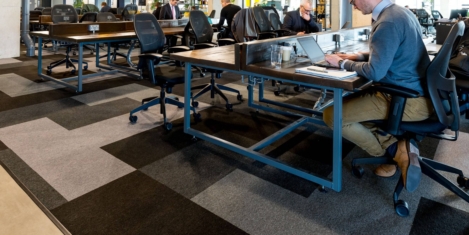October 2, 2018
How to measure the impact of biophilia on individual performance
 The improvement in well-being and performance in the workplace are economic and social critical factors since the loss of productivity for companies means a cost of up to US$ 550,000 million per year. Numerous studies affirm that biophilic design, defined as a response to the inherent need of human beings to be in contact with nature, in the workplace improves productivity and user well-being. As Lord Kelvin said, if you cannot measure it, you cannot improve it, so the challenge that arises is how to objectify and quantify rigorously the features that improve productivity and wellbeing in spaces designed with biophilia in mind. From this, it is necessary to go a step further and objectify the design criteria serving as an operator for performance and wellbeing in design practice.
The improvement in well-being and performance in the workplace are economic and social critical factors since the loss of productivity for companies means a cost of up to US$ 550,000 million per year. Numerous studies affirm that biophilic design, defined as a response to the inherent need of human beings to be in contact with nature, in the workplace improves productivity and user well-being. As Lord Kelvin said, if you cannot measure it, you cannot improve it, so the challenge that arises is how to objectify and quantify rigorously the features that improve productivity and wellbeing in spaces designed with biophilia in mind. From this, it is necessary to go a step further and objectify the design criteria serving as an operator for performance and wellbeing in design practice.

















 Employers need to recognise the workplace as integral to delivering a business’ commercial strategy, and treat employees as ‘workplace consumers’ – creating ‘frictionless’ experiences and environments that help them perform to their best ability. This is according to a report: ‘Optimising performance: defining, designing, maintaining and evolving workplace experiences’ from Interserve, undertaken in partnership with Advanced Workplace Associates (AWA). The two-year study into the science behind effective working environments argues there is a need to radically re-envisage workplaces to optimise team productivity and maximise the value of physical working environments. It sets out a series of critical steps for knowledge-based businesses to revolutionise the workplace – and thereby aid employee performance. The report argues that traditional silos, from IT and HR to facilities, need to be broken down to integrate the management of the workplace as part of a ‘one-team’ approach; doing so will ensure companies can deliver a streamlined workplace experience which supports employee productivity.
Employers need to recognise the workplace as integral to delivering a business’ commercial strategy, and treat employees as ‘workplace consumers’ – creating ‘frictionless’ experiences and environments that help them perform to their best ability. This is according to a report: ‘Optimising performance: defining, designing, maintaining and evolving workplace experiences’ from Interserve, undertaken in partnership with Advanced Workplace Associates (AWA). The two-year study into the science behind effective working environments argues there is a need to radically re-envisage workplaces to optimise team productivity and maximise the value of physical working environments. It sets out a series of critical steps for knowledge-based businesses to revolutionise the workplace – and thereby aid employee performance. The report argues that traditional silos, from IT and HR to facilities, need to be broken down to integrate the management of the workplace as part of a ‘one-team’ approach; doing so will ensure companies can deliver a streamlined workplace experience which supports employee productivity.
















September 28, 2018
The horrors and harmonies of workplace hierarchy
by Monica Parker • Comment, Technology, Workplace design
(more…)